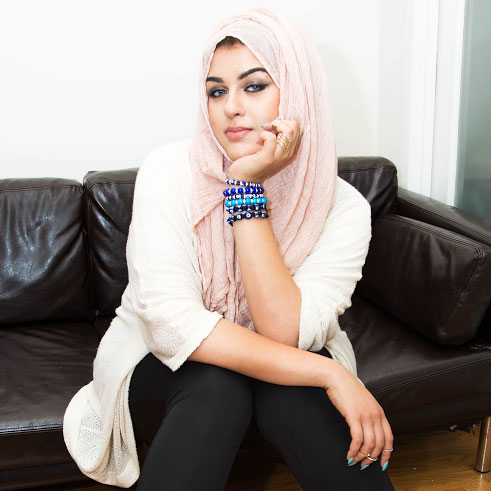Amani Al-Khatahtbeh founded Muslim Girl in 2009 to give Muslim women a space where they could talk back. In the years since, she’s listened as they’ve spoken out about fashion, politics, human rights, and the issues they face online and in their communities.
Now, six years later, the online magazine has a new home at MuslimGirl.com. But that’s not the only thing that’s new. The founder is also using the relaunch to shine a much-needed light on another important topic: the stigma that keeps so many women in the Muslim community from speaking out about their mental health.
We spoke to Al-Khatahtbeh about the relaunch, the stigma she’s seen in the Muslim community, and more. Read on and get ready to say “salam” to the new Muslim Girl.
…
For our readers who aren’t familiar with your site, what can you tell us about Muslim Girl?
Muslim Girl is an online platform by and for millennial Muslim women that covers contemporary topics, from pop culture and current events to fashion and feminism. Our goal is to empower media representation for Muslim women in Western societies and combat negative stereotypes surrounding Islam and Muslims. We tackle the conversations that have been traditionally shied away from.
Muslim Girl gives Muslim women a place to talk back. What have you heard them say about mental health?
People don’t talk about mental health in the Muslim community. The topic is heavily stigmatized, and even within conversations surrounding health, people of color rarely have a space. Aside from a handful of Muslim women counselors who have been doing exceptional work for the community in this area, women of color in the mental health field are a rarity. This leads to a major cultural disconnect that can further stigmatize Muslim women seeking help.
What kind of stigma does the Muslim community face when dealing with mental health issues?
There’s a stigma that mental health isn’t a problem in our community, or that there’s something wrong with you if, for example, you need to see a counselor. The fact of the matter is that being a Muslim in today’s hateful climate can be traumatic. With violent policies that disproportionately impact the Muslim American community, and increasing anti-Muslim hysteria fanned by the likes of Trump and others, Muslim families and Muslim youth have a lot to deal with.
Have you seen that play out in your own life?
Absolutely. Unfortunately, I’ve seen the devastating impact that neglecting mental health can have in the lives of women I know. Especially with our generation of moving and shaking young women, it’s so important that we are proactive in taking care of ourselves early on. It’s important to never allow ourselves to reach a place of hopelessness.
Why was it important to you to give Muslim women a place to talk about mental health?
This winter, we were forced to publish a Crisis Safety Manual for Muslim women on how to safely navigate moments of media frenzies and heightened Islamophobia. The hateful rhetoric of the 2016 presidential campaigns has especially exasperated the situation, and Muslim women — especially those who choose to wear headscarves — are the most visible targets. On top of the social and cultural issues that millennial Muslim women must uniquely navigate, they also have to deal with cultural stigmas surrounding mental health. It’s important for us to offer a platform for those conversations and reposition the importance of mental health in our community.
What would you say to someone who is struggling with their mental health and is afraid of asking for help?
There are people who love you and care about you. One of the most natural responses people have is to withdraw themselves. Don’t let it reach a point of isolation. Reach out to someone you trust, or a reliable resource, for support. Don’t be discouraged by the stigma: You and your health come first, and you are entitled to make the decisions you deem necessary to care for yourself.
What can our readers do if they’d like to submit a post for Muslim Girl’s site?
We’re eager to represent diverse experiences and opinions and offer anonymity if preferred. Submissions can be sent directly to [email protected].
…
Amani Al-Khatahtbeh is the founder and editor-in-chief of MuslimGirl.net, the leading online magazine for American Muslim women. Reclaiming the Muslim women’s narrative in Western media with its own unprecedented columns in outlets like Teen Vogue, Fortune, and Huffington Post, Muslim Girl is currently forging a new path by becoming the forefront of Muslim women’s issues in mainstream coverage. Amani made the annual Forbes 30 Under 30 list for 2016, making her the first veiled woman to be honored in the media category and Muslim Girl the first Muslim company to ever receive the recognition. Amani was named one of Teen Vogue’s “New Faces of Feminism” in its February 2016 issue. She recently debuted her new weekly webshow with MTV called “Uncovered” on Snapchat Discover. She regularly provides commentary to media outlets like CNN, BBC, and Al Jazeera.

Bellla
Thank you for using your voice, for standing up for people, for leading by example.
I say this as a non Muslim. We all need to stand together on such issues
God bless
Anika Talukder
Hi
My name is Anika and would you mind coming to Peoria IL to help me and my friend with talking about muslim mental illness since we are trying to break the stigma around it